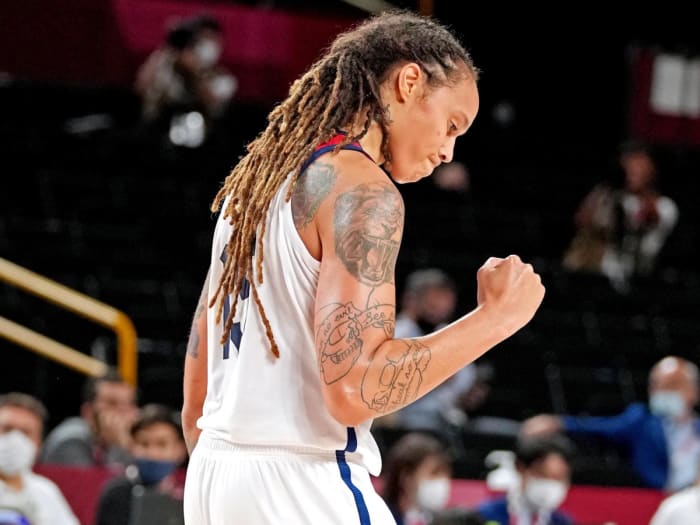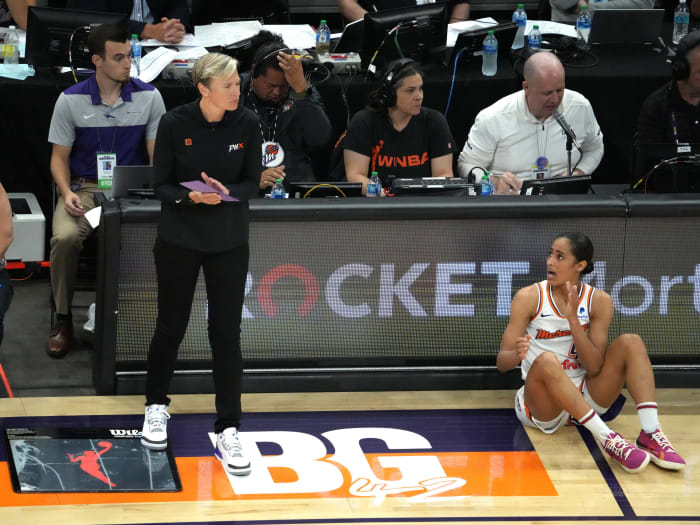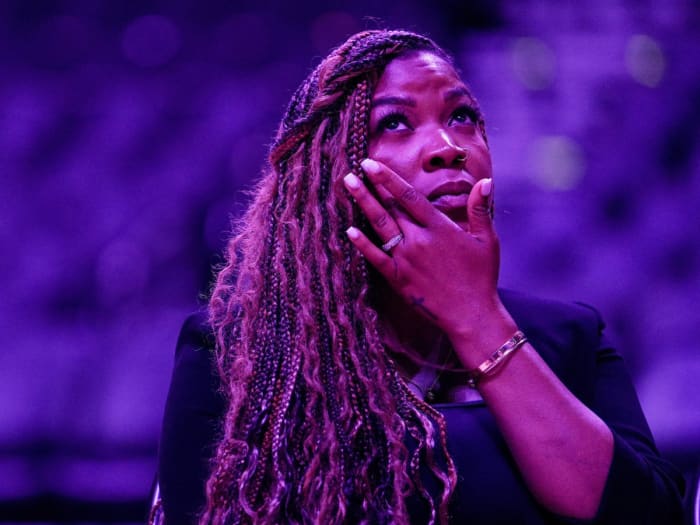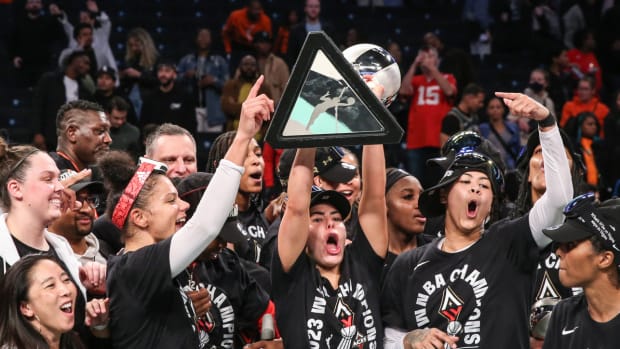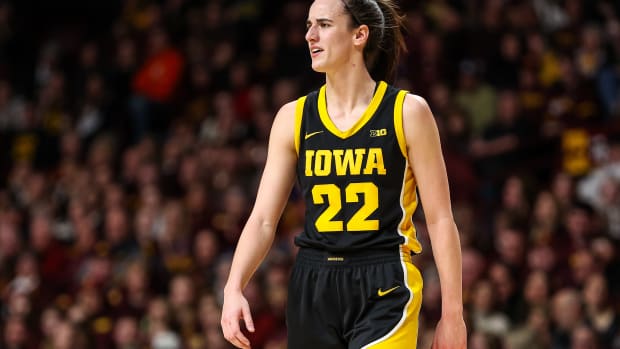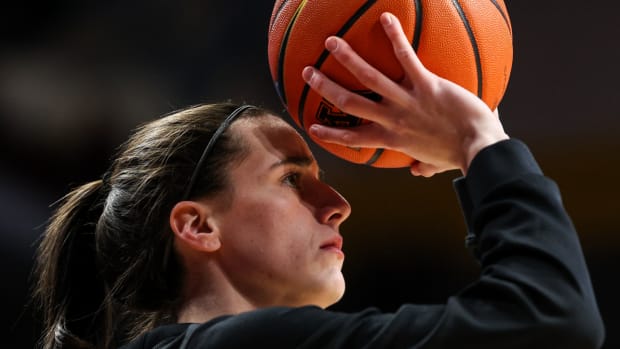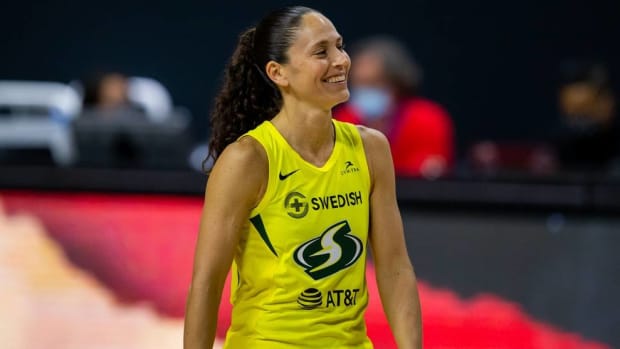Brittney Griner Timeline: Everything That Led Up to the WNBA Star’s Release From Russia
After nearly 10 months of being in Russian custody, Brittney Griner is coming home.
The Mercury center was arrested Feb. 17 at Sheremetyevo International Airport near Moscow, where Russian officials said they discovered vape cartridges containing hashish oil in her luggage. On Aug. 4, Griner was sentenced to nine years in Russian prison. And Dec. 8, she was released in a prisoner swap to return to the United States.
“The outcome seemed inevitable, and yet it was so hard to trust,” writes Sports Illustrated’s Michael Rosenberg following her release. “Griner was going to be trapped in a Russian penal colony until she wasn’t. For her family and friends, the relief today is overwhelming.”
Much has happened in between to gain clarity on her situation as well as to bring her home. Here is a timeline of everything that led up to Griner’s release:
Feb. 17: Griner is detained
When traveling to Russia to play in her seventh season with the prominent women’s basketball team UMMC Ekaterinburg, Griner was detained for the vape cartridges containing hashish oil in her luggage. Hashish oil is a more concentrated form of marijuana and is often used in vape form.
Feb. 24: Russia invades Ukraine
On the orders of Vladimir Putin, Russian military forces invaded Ukraine. The start of the war resulted in numerous sanctions from the U.S., complicating efforts by officials to negotiate her return.
March 5: News breaks about Griner’s detainment
Though arrested in February, Griner’s detainment was not made public until more than two weeks later when The New York Times reported the Russian Federal Customs Service’s claims to have detained an American basketball star. Initially, her identity was not revealed by the Russian officials, but Russian news agency TASS, citing a law enforcement source, later identified the athlete as Griner.
Later that day, video emerged of Griner’s arrest at the airport. In footage from the Russian Federal Customs Service obtained by CBS News, a person who appeared to be Griner can be seen being pulled aside by customs service officials in the airport. The video then shows someone searching her belongings.
March 6: United States Secretary of State discusses Griner’s detainment
When addressing the news of the arrest, U.S. Secretary of State Antony Blinken kept his comments vague, even referring to Griner as “the individual you mentioned” during his press conference. He said, “There’s only so much I can say, given privacy considerations at this point,” but did mention his support.
“Whenever an American is detained anywhere in the world, we of course stand ready to provide every possible assistance,” Blinken said. “And that includes in Russia.”
March 17: Griner’s detention is extended
Russian news agency TASS reported that “the court granted the petition of the investigation and extended the term of U.S. citizen Griner’s detention until May 19.” Hours later, ESPN reported that consular officials had not had access to Griner.
March 23: U.S. officials meet with Griner
State Department spokesperson Ned Price told CNN she was in “good condition.”
“Within the past couple hours, an official from our embassy has been granted consular access to Brittney Griner,” Price said. “We were able to check on her condition. We will continue to work very closely with her legal team, with her broader network to see to it that she’s treated fairly. That is a message that we will continue to convey in no uncertain terms to the Russian federation.
April 11: WNBA commissioner assures that the league is working to ensure Griner’s safe return from Russia
Hours before the WNBA draft, Cathy Engelbert said, “We continue to be working diligently on bringing Brittney Griner home. This is an unimaginable situation for [Griner] to be in. … Certainly we’re trying everything that we can, every angle, working through with her legal representation, her agent, elected leaders, the administration, just everybody in our ecosystem to try and find ways to get her home safely and as quickly as we can.”
April 27: Trevor Reed’s release sparks hope
The Biden Administration announced the release of former Marine Trevor Reed, who had been in Russian custody since 2019. It was via a prisoner exchange the move sparked hope for Griner’s case.
May 3: U.S. government deems Griner “wrongfully detained.”
ESPN reported the government had reclassified Griner’s status, but officials declined to say what triggered the change. The decision signals a drastic shift in how officials will try to get Griner back on American soil. Until this point, Griner’s case had been handled by the consular office, but now will be passed to the special envoy’s office.
“The Department of State has determined that the Russian Federation has wrongfully detained U.S. citizen Brittney Griner,” a State Department official told ESPN in a statement. “With this determination, the Special Presidential Envoy for Hostage Affairs Roger Carstens will lead the interagency team for securing Brittney Griner’s release.”
Griner had been detained for 75 days at this point.
May 3: WNBA announces it will honor Griner with a special season-long tribute
The league introduced a floor decal, which will be used by all 12 teams, featuring the seven-time All-Star’s initials along with her number (No. 42).
May 13: Griner detention extended 30 days
A U.S. Department of State spokesperson told The Washington Post that U.S. diplomats were able to speak with the basketball star during the hearing and that she is doing “as well as can be expected in these circumstances.”
This same day, the Russian news agency TASS begins reporting that there were negotiations between the U.S. and Russia to exchange Griner for Viktor Bout, a Russian man serving a 25-year sentence in the United States for financing terrorism.
May 17: NBA commissioner Adam Silver addresses league’s role in helping bring Griner home
“Both the WNBA and its brother league, the NBA, we have a huge responsibility to Brittney Griner as one of our players. Part of our decision to not take a higher profile here frankly came at the suggestion of experts in and out of government who thought the best path to getting Brittney out was not to amplify the issue,” Silver told ESPN’s Malika Andrews the same night as the draft lottery. “Having said that, there’s an enormous role for the public to play through protests or letting their representatives know how strongly they feel about this.”
Earlier that day the U.S. Embassy said Russia had prevented them from visiting Griner three times in May and Griner’s agent, Lindsay Kagawa Colas, declared that the basketball player was “being used as a political bargaining chip.”
May 25: Cherelle Griner appears on “Good Morning America”
For the first time since her wife was detained, Cherelle Griner gave an interview about the difficulty of the last few months. She revealed to GMA’s Robin Roberts that she has spoken to U.S. Secretary of State Antony Blinken but was still hoping to meet with President Biden.
“I just keep hearing that, you know, he has the power,” Cherelle said, referring to President Biden. “She’s a political pawn. So if they’re holding her because they want you to do something, then I want you to do it.”
Cherelle did say that she’s been able to communicate with her wife through letters, but has not spoken with her directly since the day she was detained.
May 28: Griner’s detention in Russia reaches the 100-day mark
The WNBPA shared a statement on Griner’s detention and encouraged supporters to sign and circulate the ”We Are BG” petition.
Following the release of the WNBPA’s statement, players, teams and coaches from around the league and the world of women’s basketball took to social media to shine a spotlight on Griner on the 100th day of her detention.
June 13: State department, Mercury officials meet
The Mercury met with the State Department in Washington, D.C., ahead of their game with the Mystics. That meeting was followed by a meeting with U.S. Representative Greg Stanton, a Democrat from Arizona (a longtime Mercury fan), and Sheila Jackson Lee, a Democrat from Griner’s hometown of Houston.
July 1: Griner’s trial begins
Griner’s lawyer, Aleksandr Boikov, said before the trial that he expected it to take up to two months, according to The New York Times. A U.S. official told CNN the U.S. Embassy in Moscow would send a diplomat to the first hearing. Several officials and experts familiar with Griner’s case told ESPN a trial and forthcoming conviction have always been likely developments, with sources telling ESPN that regardless of whether the Russian prosecutors present compelling or entirely fabricated evidence, the country has indicated it is willing to negotiate Griner’s release.
July 4: Griner writes letter to White House
On the Fourth of July, Griner wrote a letter to Biden, excerpts of which ESPN released.
“As I sit here in a Russian prison, alone with my thoughts and without the protection of my wife, family, friends, Olympic jersey, or any accomplishments, I’m terrified I might be here forever,” Griner wrote.
July 6: Biden speak with Griner’s wife
Cherelle said she had spoken with President Biden and Vice President Kamala Harris. A White House statement said Biden reassured Cherelle that he was working to release Brittney from Russia.
“While I will remain concerned and outspoken until she is back home, I am hopeful in knowing that the President read my wife’s letter and took the time to respond,” Cherelle said in a statement through ESPN. “I know BG will be able to find comfort in knowing she has not been forgotten.”
July 7: Griner pleads guilty
In the second hearing of her trial, Griner told the court that she packed the vape cartridges accidentally and had no intention of breaking Russian law. The guilty plea was seen as a strategy to help facilitate a prisoner swap.
July 27: Griner testifies, U.S. offers deal
Griner testified in court July 27 and according to the Associated Press, “a language interpreter provided during her questioning translated only a fraction of what was said and officials instructed her to sign documents without providing an explanation.”
Griner maintained that she did not know how the cannabis oil, for which she does have a doctor’s recommendation, ended up in her luggage; however, she explained how she quickly packed “while under great stress,” per the AP. She stated she was not offered access to lawyers or informed of her rights.
Secretary of State Blinken said he is planning to speak with Russian foreign minister Sergey Lavrov and demand Griner and former U.S. marine Paul Whelan’s release. Blinken added that the U.S. “put a substantial proposal on the table weeks ago” to help with the release, which is the first public acknowledgment of the proposal.
Whelan is being held in a Russian prison after he was convicted in June 2020 and sentenced to 16 years on suspicion of spying.
Aug. 4: Griner is sentenced
Griner was sentenced to nine years in Russian prison on a charge of bringing hashish oil into Russia. She was also fined 1 million rubles, or about $16,300.
President Biden emphasized that the detainment is “wrongful” and said in a statement: “It’s unacceptable, and I call on Russia to release her immediately so she can be with her wife, loved ones, friends, and teammates. My administration will continue to work tirelessly and pursue every possible avenue to bring Brittney and Paul Whelan home safely as soon as possible.”
The Mercury put out a statement supporting Griner, reading, in part: “We remain heartbroken for her, as we have every day for nearly six months. We remain grateful to and confident in the public servants working every day to return her to her family and us. We remain faithful the Administration will do what it takes to end her wrongful detention.”
Sept. 16: Biden meets with Griner’s wife
President Biden met with Griner’s wife, Cherelle Griner, and Elizabeth Whelan, sister of detained former U.S. marine Paul Whelan, to reassure them that his administration is dedicated to bringing their loved ones home. Through the seven-month ordeal, this is the first time Biden has met in person with Griner’s family.
Oct. 25: Court denies Griner’s appeal
A Moscow court rejected Griner’s appeal of her nine-year prison sentence. This comes as the U.S. government has reportedly been discussing a potential prisoner exchange with Russia.
Nov. 9: Griner reportedly transferred to Russian penal colony, location unknown
Griner’s lawyers announced that the basketball star was being transferred to a penal colony, but they did not know of her location. “Brittney was transferred from the detention center in Iksha on the 4th November. She is now on her way to a penal colony. We do not have any information on her exact current location or her final destination,” the statement from her legal team said.
Nov. 17: Griner moved to penal colony in Russian region of Mordovia
Griner has been moved to a penal colony in Russia’s Mordovia region. Griner’s penal colony, known as Female Penal Colony IK-2, is located about 300 miles southeast of Moscow in Yavas, Russia. A U.S. State Department spokesperson told Reuters the agency is “aware of reports of her location, and in frequent contact with [Griner’s] legal team.”
Dec. 8: Griner is released in a prisoner swap
Griner was released from a Russian prison after the U.S. reached a prisoner swap deal that will send international arms dealer Viktor Bout in return. According to CBS News, President Biden gave final approval on the deal in the last week. The prisoner swap took place Thursday in the United Arab Emirates, according to CBS, a week after the agreement had been reached.
On Thursday morning, Biden confirmed the news after speaking to Griner. “Moments ago I spoke to Brittney Griner,” he shared on Twitter. “She is safe. She is on a plane. She is on her way home.”
The deal did not include Whelan, the 52-year-old former Marine who was arrested in Russia in 2018 on accusations of espionage and sentenced to 16 years in prison. The U.S. had reportedly discussed bringing home both Griner and Whelan in exchange for Bout, a deal that Biden says Russia was unwilling to make. After Griner’s release, Whelan’s family released a statement, both praising the move to bring Griner home and stating that Whelan’s continued imprisonment is “a catastrophe for Paul.”
“I am so glad that Brittney Griner is on her way home,” David Whelan, Paul’s twin brother, said in a statement Thursday via ABC’s Jay O’Brien. “As the family member of a Russian hostage, I can literally only imagine the joy she will have, being reunited with her loved ones, and in time for the holidays. There is no greater success than for a wrongful detainee to be free and for them to go home. The Biden Administration made the right decision to bring Ms. Griner home, and to make the deal that was possible, rather than waiting for one that wasn’t going to happen.”













